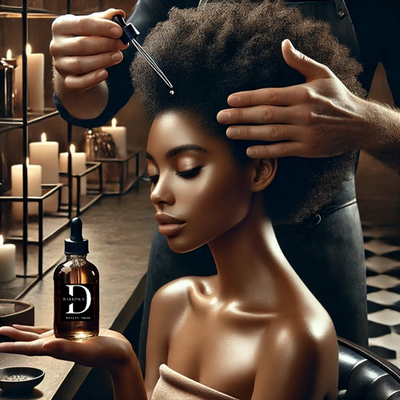The Secret to Regrowing Hair Naturally (For Both Men & Women!)

Hair loss can feel like an emotional rollercoaster, whether you’re watching your edges thin out or noticing a patch of scalp that wasn’t there last month. But here’s the good news: hair loss isn’t the end of the road. With the right natural hair loss treatments and remedies, you can regain confidence and give your scalp the TLC it deserves.
Why Does Hair Loss Happen?
Hair loss doesn’t discriminate—it happens to women and men alike. While it’s perfectly normal to lose 50-100 strands a day, excessive shedding can be caused by:
- Stress: Yes, those late-night deadlines and family drama can wreak havoc on your hair.
- Hormonal Changes: Pregnancy, menopause, and hormonal imbalances like PCOS can trigger hair loss in women. For men, testosterone-related issues often play a role.
- Nutritional Deficiencies: Lacking key vitamins like biotin, iron, or zinc can lead to weak, brittle hair.
- Hairstyling Habits: Tight braids, ponytails, and heat damage are some of the biggest culprits, especially for Black women and men with textured hair.
- Medical Conditions: Alopecia areata, thyroid disorders, and scalp infections can also cause hair loss.
Knowing the root cause of your hair loss is the first step in choosing the right remedy. Now, let’s dive into some natural hair loss treatments and how they can help restore your crown.
1. Scalp Care is Self-Care
Healthy hair starts with a healthy scalp. Here’s how you can pamper it:
- Massage Your Scalp: A 5-minute daily massage can improve blood circulation and stimulate hair follicles. Use oils like peppermint, rosemary, or castor oil for added benefits. Studies show these oils can encourage hair growth naturally.
- Exfoliate: Dead skin cells and product buildup can clog your hair follicles. Use a gentle scalp scrub once a week to keep your scalp clean and ready for growth.
2. Nourish Your Hair from Within
You’ve heard the phrase, “You are what you eat,” and your hair is no exception. Nutrient-packed foods can act as a natural hair loss treatment:
- Protein: Hair is made of keratin, a type of protein. Add eggs, fish, and legumes to your diet.
- Omega-3 Fatty Acids: Found in salmon, chia seeds, and walnuts, these promote a healthy scalp.
- Leafy Greens: Spinach and kale are packed with iron and vitamins A and C, which improve hair strength and shine.
If your diet isn’t cutting it, consider supplements like biotin, zinc, or vitamin D—but consult with a healthcare provider first.
3. Try DIY Hair Masks
Homemade hair masks can work wonders for thinning hair. Here are two easy recipes:
- Avocado and Egg Mask: Mix half an avocado with one egg and a tablespoon of olive oil. Apply to your hair and scalp, leave for 20 minutes, and rinse. This mask nourishes and strengthens weak strands.
- Aloe Vera Gel: Apply fresh aloe vera gel to your scalp to soothe inflammation and stimulate growth. It’s also an excellent natural conditioner.
4. Avoid Overstyling and Heat
Protective styles are fantastic, but tight braids and excessive use of hot tools can do more harm than good. Give your hair a break by:
- Wearing loose, low-tension styles.
- Air-drying your hair instead of blow-drying.
- Using heat protectants if you must use hot tools.
5. Herbs and Essential Oils to the Rescue
Nature has a solution for almost everything, including hair loss. Consider these remedies:
- Fenugreek Seeds: Soak a tablespoon of fenugreek seeds overnight, blend into a paste, and apply to your scalp. Fenugreek is known to strengthen hair and reduce shedding.
- Onion Juice: It might sound unappealing, but onion juice has sulfur compounds that boost collagen production and regrow hair. Apply it to your scalp for 15 minutes, then rinse.
- Rosemary Essential Oil: One of the most effective natural hair loss treatments, rosemary oil can improve circulation and stimulate growth. Add a few drops to your shampoo or carrier oil for a scalp massage.
6. Consistency is Key
Hair loss remedies take time. Whether you’re using oils, DIY masks, or supplements, commit to a routine for at least 3-6 months to see noticeable results. Be patient with your hair—it’s worth the wait.
When to Seek Professional Help
If natural remedies don’t yield results, it might be time to consult a dermatologist or trichologist. Medical treatments like PRP therapy (platelet-rich plasma), microneedling, or prescription medications may be needed for severe cases of hair loss.
The Final Word
Hair loss can be a stressful experience, but it’s also an opportunity to care for yourself in new, nourishing ways. From scalp massages to nutrient-rich diets and essential oils, there are plenty of natural hair loss treatments to explore. Remember, your hair journey is personal, and progress—no matter how small—is still progress.
So, whether you’re regrowing your edges or looking to thicken your crown, know that healthier, stronger hair is within reach. Stick with these remedies, and your hair will thank you later!


